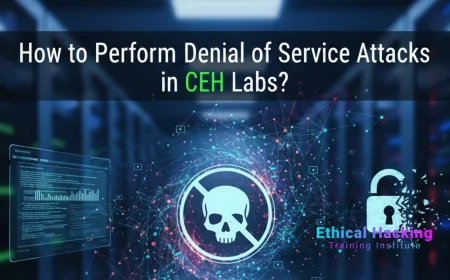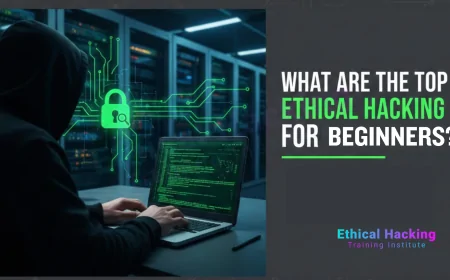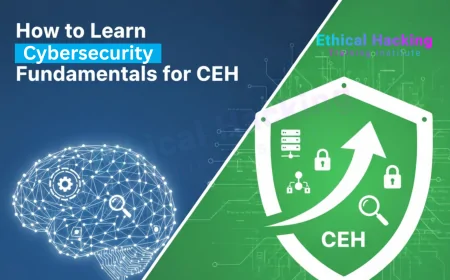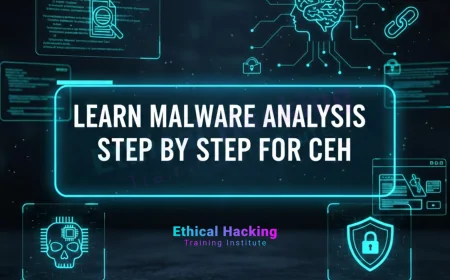CEH Approved Training: How to Choose the Best Programs | Best Practices for Choosing CEH Certification Training
Explore how to choose the best EC-Council CEH approved training programs. Compare course formats, costs, instructors, lab access, and outcomes to find the right ethical hacking certification path for you.
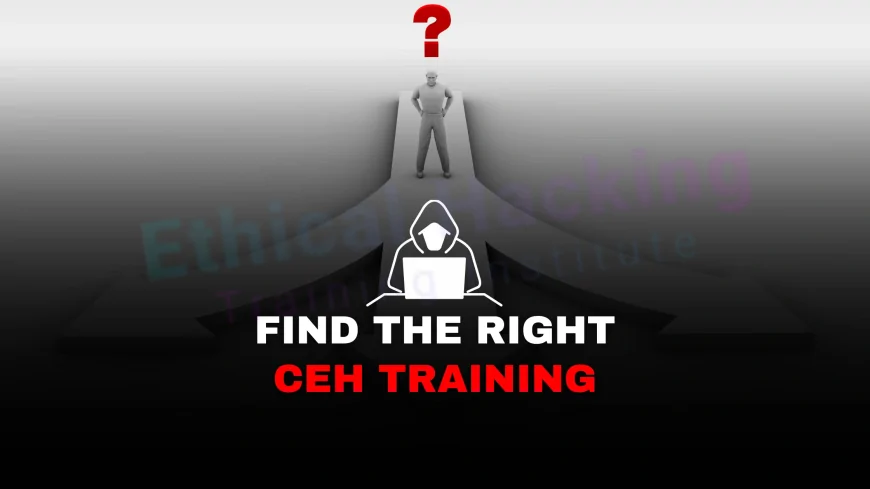
Table of Contents
- Introduction
- Why EC‑Council Approved Training Matters
- Training Delivery Formats
- Cost Comparison by Format
- Hands‑On Labs & CyberQ Access
- Instructor Quality & Support
- Accreditation, Guarantees & Reviews
- Value: Job Outcomes & ROI
- Making the Right Choice
- FAQs
- Conclusion
Introduction
EC-Council’s CEH is considered an essential credential for professionals aiming to master ethical hacking. But the quality of your training has a major impact on success. Officially approved CEH courses help ensure you receive accurate, up-to-date content, ethical hacking tools, lab access, and examination support. Choose a training option that complements your goals and learning style.
Why EC‑Council Approved Training Matters
When preparing for the Certified Ethical Hacker (CEH) exam, not all training programs are created equal. Choosing an EC-Council Accredited Training Center (ATC) ensures that you are learning directly from official, trusted, and up-to-date sources.You’ll not only feel confident at exam time but also more prepared for real cybersecurity environments.
1. Official Courseware & Updates
EC-Council ATCs offer the latest CEH courseware, which is frequently updated to reflect evolving threats, hacking techniques, and tools—including topics like AI-powered cyberattacks, ransomware, deepfakes, and cloud vulnerabilities. This ensures you aren’t learning outdated content.
2. CyberQ (iLabs) Access for Hands-On Skills
Approved training includes CyberQ Labs, EC-Council’s official cloud-based virtual lab environment. These labs simulate real-world scenarios and give learners a platform to:
- Practice reconnaissance, enumeration, and exploitation techniques
- Use tools like Metasploit, Wireshark, Nmap, Burp Suite, and more
- Prepare for CEH Master (practical) certification
3. Eligibility for CEH Exam Without Experience
Normally, CEH exam candidates need to prove two years of work experience or complete an EC-Council approved course. By enrolling in an approved training program, you automatically satisfy the eligibility criteria and may even receive an exam voucher as part of the package.
4. Employer Recognition & Global Credibility
Employers trust EC-Council approved programs because they meet ANSI/ISO/IEC 17024 standards and are accepted under DoD 8570/8140. Completing training at an authorized center boosts your resume and assures HR managers that you’ve received legitimate instruction.
5. Post-Course Support & Continuing Education
Many ATCs offer lifetime access to recorded sessions, revision bootcamps, re-sit options, career mentorship, and practice exams—value-adds that are typically unavailable in unauthorized programs.
In short, choosing an EC-Council approved CEH training provider ensures you’re making a smart investment in your career, with the backing of the organization that created the certification itself.
Training Delivery Formats
- Instructor‑led Online: Live virtual bootcamps with real-time instruction—ideal for interaction.
- Self‑paced On‑Demand: Video modules and practice quizzes—flexible but requires discipline.
- In‑Person Classroom: Hands-on, intensive 4–5 day sessions with expert instructors.
- Hybrid Training: Combines on-demand theory with scheduled live labs & webinars.
Cost Comparison by Format
CEH training costs vary widely by format and provider:
| Format | Cost (USD) | Typical Inclusions |
|---|---|---|
| Self‑paced | 1,500–3,000 | Videos, eBook, labs (limited), exam voucher optional |
| Instructor‑led online | 2,500–4,000 | Live classes, labs, exam voucher included:contentReference[oaicite:1]{index=1} |
| In‑person | 3,000–5,000 | Bootcamp setting, hands-on, lab access, voucher included:contentReference[oaicite:2]{index=2} |
| Hybrid | 2,200–3,500 | On-demand + live labs/webinars |
In India, courses range from ₹50,000–₹120,000 depending on format, provider, and lab access:contentReference[oaicite:3]{index=3}.
Hands-On Labs & CyberQ Access
High-quality CEH programs include CyberQ (formerly iLabs) for real-world hacking scenarios:
- Live cloud-based labs—no setup required
- 250–350 exercises covering multiple attack scenarios
- Essential for applying theory and passing both CEH and CEH Master practical exams
Ensure your chosen program includes bundled lab access or affordable add-ons.
Instructor Quality & Support
When selecting a CEH-approved training program, the quality of instructors and the level of support offered are just as important as the curriculum itself. The instructor's experience, certifications, and teaching ability can significantly influence your understanding, engagement, and exam readiness.
1. EC-Council Certified Instructors (CEIs)
Only EC-Council Certified Instructors are authorized to deliver official CEH content. These professionals typically hold the CEH, CEH Master, and often additional certifications like CHFI or CISSP. A qualified instructor brings both academic knowledge and hands-on experience, helping students better grasp real-world hacking scenarios.
2. Real-World Experience Matters
Look for instructors with active industry experience in ethical hacking, penetration testing, threat intelligence, or red teaming. Instructors who currently work in cybersecurity bring relevance and insight that go beyond the courseware. They often share case studies, attack strategies, and defense methods from actual security engagements.
3. Engagement & Teaching Style
Effective instructors don’t just lecture—they engage. High-quality CEH trainers:
- Use live demos and real tools in labs
- Break down complex topics like buffer overflows or privilege escalation clearly
- Encourage student interaction, questions, and discussions
4. Availability of Mentorship & Doubt Clearing
The best programs provide more than lectures. They include:
- 1:1 mentorship sessions or small group Q&As
- Doubt-clearing forums or live chat support
- Access to instructor recordings for review
This ongoing support is crucial, especially for those from non-technical backgrounds or self-paced learners who may struggle with certain CEH domains.
5. Post-Training Support & Resources
Top training providers often offer:
- Free retake sessions or brush-up classes before the exam
- Practice exams and guidance on exam strategy
- Placement or resume-building workshops
In summary, prioritize qualified, experienced, and accessible instructors when choosing a CEH training provider. Great content delivered poorly leads to weak results—while great instruction amplifies even basic materials into powerful knowledge.
Accreditation, Guarantees & Reviews
- Official EC‑Council accreditation is non-negotiable
- Beware of inflated placement claims without proof
- Refund policies, re-take vouchers, and batch re-enrollment support add value
Value: Job Outcomes & ROI
A comprehensive CEH program should equip you to:
- Qualify as a Certified Ethical Hacker by passing the exam, with the option to take the CEH Master practical.
- Show verified lab experience and project proof
- Enter roles like Security Analyst, Pen‑Tester, SOC Engineer
With demand rising, a well-chosen CEH course enhances employability and justifies the investment.
Making the Right Choice
- Prioritize EC‑Council accredited providers
- Define your preferred learning style (live vs self-paced)
- Compare lab access length and depth
- Check trainer credentials and peer reviews
- Evaluate support—mentors, Q&A, language
- Weigh guarantees, retake allowance, refund conditions
- Review ROI: career outcomes, salary uplift, certification impact
FAQs -
1. What makes a CEH course "approved"?
EC‑Council accreditation and official training materials mark an approved course.
2. Is self-paced training enough?
Yes, if disciplined—but ensure lab access and mentor support.
3. Do I need labs?
Absolutely—CyberQ labs teach hands-on skills needed for practical exams.
4. How critical is trainer quality?
Essential—qualified and helpful trainers improve outcomes.
5. Does cost reflect quality?
Not always—compare inclusions like labs, vouchers, retakes.
6. Can third-party training be good?
Yes, if they’re EC‑Council accredited and include official materials.
7. How long is lab access?
Ranges from 90–180 days—longer is better for practice.
8. Are re-take vouchers common?
Often included; always check terms before enrolling.
9. Are placement guarantees reliable?
Scrutinize claims and ask for employment data.
10. Is hybrid training effective?
Combines flexibility with live guidance—a smart compromise.
11. Do employer reimbursements play a role?
Yes—employers often cover CEH training fees post-completion.
12. Can online labs replace local VMs?
Yes—CyberQ labs mirror real systems without setup hassles.
13. How many hours of study are needed?
Typically 40–60 hours plus labs; in-person bootcamps focus deliver in 5–7 days.
14. What about multiple formats?
Many ATCs offer bundled self‑paced + live training options.
15. Is CEH Master included?
Not always. Ensure practical lab + exam support if aiming for CEH Master.
16. How to verify accreditation?
Use EC‑Council’s ATC locator and confirm your provider is listed.
17. What languages are available?
Mainly English; some ATCs offer local-language support.
18. Can students get discounts?
Yes—via academic partnerships, season promos, and EC‑Council deals:contentReference[oaicite:5]{index=5}
19. Is EC‑Council support good?
Mixed reviews—ensure backup support from your ATC:contentReference[oaicite:6]{index=6}
20. How soon after training can I attempt the exam?
Immediately—if voucher included. Self-paced might need scheduling separately.
Conclusion
Choosing a CEH-approved training program is a strategic decision that impacts your success in the cybersecurity field. Opting for accredited, lab-rich, well-supported, and reviewed courses ensures your investment is worthwhile. Whether for foundational knowledge, practical proficiency, or career advancement, the right CEH training shapes your cybersecurity journey.
What's Your Reaction?
 Like
0
Like
0
 Dislike
0
Dislike
0
 Love
0
Love
0
 Funny
0
Funny
0
 Angry
0
Angry
0
 Sad
0
Sad
0
 Wow
0
Wow
0






